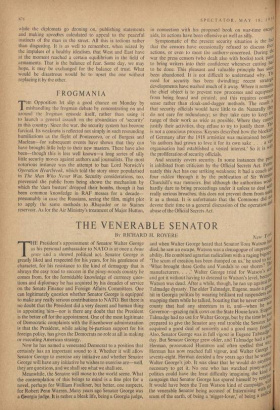FROGMANIA
THE Opposition let slip a good chance on Monday by mishandling the frogman debate by concentrating on and around the frogman episode itself, rather than using it to launch a general assault on the absurdities of 'security' in this country. Since the war. the security system has become farcical. Its weakness is reflected not simply in such resounding humiliations us the flight of Pontecorvo.• or of Burgess and Maclean—for subsequent events have shown that they can have brought little help to their new masters. There have also been—though this is less well known—a long series of silly little security moves against authors and journalists. The most notorious instance was the attempt to ban Lord Norwich's Operation Heartbreak, which told the story since popularised in The Alan Who Never Was. Security considerations, too, prevented the public from being shown the mechanism by which the 'dam busters' dropped their bombs, though it has been common knowledge in RAF messes for a decade— presumably in case the Russians, seeing the film, might plot to apply the same methods to Rhayader or to Staines reservoir. As for the Air Ministry's treatment of Major Hutton,
foe' their
tC
ti1C
War moo
It theY tlic
no°1 Od atis` vast with oess
anu stilt
oul`l SiO Dot and in connection with his proposed book on war-time es aids, its actions have been offensive as well as silly. Symptomatic of the present security situation is the that the censors have occasionally refused to discuss actions, or even to meet the authors. concerned. During war the press censors (who dealt also with books) took to bring writers into their confidence whenever cutting to be done. This pleasant and valuable principle has been abandoned. It is not difficult to understand why. need for security has been dwindling; recent stra developments have washed much of it away. Where it rem the chief object is to prevent new processes and equip from being found and pirated; and this requires coin sense rather than cloak-and-dagger methods. The resu that security officials would have little to do. Naturally do not care for redundancy; so they take care to keep range of their work as wide as possible. Where they ca justify their activities, they refuse to try to 'justify them. is not a conscious process. Keynes described how the bloc' of Germany after the 1918 armistice was maintained bec 'its authors had grown to love it for its own sake . . . a organisation had established a vested interest.' So it is the proliferation of security officials. And security covers security. In some instances the is inhibited from criticism by the Official Secrets Act. Fe nately this Act has one striking weakness; it had a coach four ridden through it by the publication of Sir Win Churchill's war memoirs. But although the authorities WI hardly dare to bring proceedings under it unless to deal really serious breaches, this does not prevent them from it as a threat. It is unfortunate that the Commons did devote their time to a general discussion of the operation abuse of the Official Secrets Act.


































 Previous page
Previous page